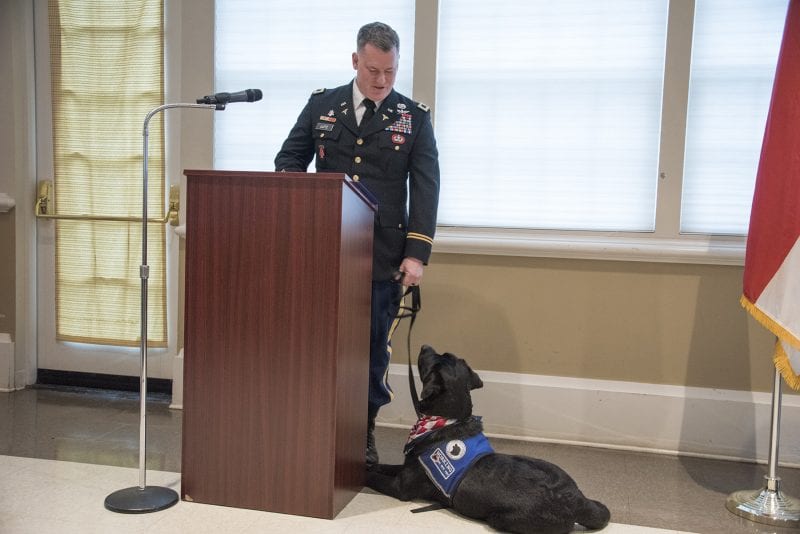NEWS
Local Non-Profit Trains Service Dogs to Help Veterans Cope With Stress

As he spoke to the Veteran’s Day crowd, a CTM service dog named Reid lay calmly at Col. Lutz’s side. (Bill Giduz photo)
The highlight of this year’s Veteran’s Day event in Davidson was the keynote talk by Col. Robert Lutz, an Army medical corps physician and retiree who was deployed 12 times in the Middle East. He told the audience, “I’ve been shot at, rocketed, mortared for 60 days straight, landed behind enemy lines, and landed under fire to support US and coalition forces in our longest war on record.”
Lutz, a 1987 graduate of Davidson College, now leads a much calmer life in his current career as team doctor to the college’s varsity athletes. Col. Lutz revealed to the standing room only audience that though he understood the symptoms he experienced upon redeployment were normal, the cumulative effects of his combat experiences in the Middle East led him to pursue treatment for post-traumatic stress.
When Col. Lutz retired from the Army recently, he and his spouse, Suzy, were determined to find a way to help veterans suffering PTSD. In 2016, after seeing the tremendous benefit a dog made in the life of a young woman whose active duty husband died, they founded “Continuing the Mission (CTM),” a non-profit organization that supports veterans living with PTSD by providing them with trained service dogs.
Creating the organization was an easy decision for Suzy, who had 30 years’ experience in obedience and agility training of dogs, as well as a profound desire to help veterans like her husband. In his Veteran’s Day talk, Col. Lutz addressed PTSD, and the challenges some soldiers face upon returning home after deployment. The intensely close bonds that grow between combat soldiers in the field are hard to reproduce in civilian life. Many vets are troubled returning to a nation that seems polarized, divided, and bereft of the sense of purpose and belonging that they experienced while deployed. “We come back to a nation that does not understand us,” Col. Lutz said. “We are told that normal responses to the situations we have found ourselves in are abnormal. In my opinion, it is abnormal not to have some of these PTSD symptoms.”

Suzy Lutz (r) held Ela, a CTM puppy in training, at the Veterans Day ceremony. Ann Cripps (l) serves as Ela’s foster Mom. (Bill Giduz photo)
Suzy Lutz explained that PTSD is a condition that waxes and wanes in their household. “It has had a significant impact on our family, which is why we feel so strongly about it,” she said. “CTM is a way that we as vets can help fellow vets.”
Throughout the time that Col. Lutz spoke to the Veterans Day crowd, a well-mannered CTM service dog named Reid lay on the floor at his side.
He explained that the CTM program begins with selection of an 8-12-week puppy who is “adopted” by a foster family. The family nurtures the dog through about two years of training by Suzy and other CTM volunteers, and then the dog is given to its permanent owner in a “leash ceremony.”
During the ceremony, dogs participating in the program and their puppy raisers demonstrate their response to commands just like a weekly training session. The veteran and their newly paired dog participate in the training and are welcomed into the community as they receive a leash and a commemorative nameplate that has been passed from volunteer to volunteer. “We do more than just hand the dog off to the veteran,” said Suzy. “We demonstrate that everyone at CTM is part of a family.”
There are currently nine dogs in the program. The young puppies remain with a foster family for around two years, learning house training, how to be confident in new situations, to walk on a leash, and to be calm in a family environment. The trained canine companions provide PTSD victims a feeling of security and safety and aid their reintegration into everyday life.
Dogs who have been successfully trained are able to perform several specific actions for their owners. They can “block” (standing in front

Careful, prolonged training creates strong, healthy bonds in CTM families.
of client and other people in a nonthreatening manner), “watch” (standing behind the client and between other people in a nonthreatening way), “lights” (turning lights on and off), “bring” (retrieving an object), and “rest” (laying their heads in a client’s lap in a comforting manner).
CTM charges clients nothing for training, raising, and caring for the service dogs, and relies solely on donations for its operation. Suzy now serves as executive director of CTM, and Robert serves as medical director. He reviews veteran candidates and provides input on need and suitability for a service dog. But he gives Suzy credit as the prime force behind the organization. He said, “She has turned this into an incredible program that not only provides service dogs, but also has built relationships and community among veterans and non-veterans.”
Bill Giduz
Bill Giduz was the son who followed his father’s footsteps into journalism. He has been involved his entire life with news and photography in schools he attended and jobs he’s held. He believes now that he’s got a few good years left to devote to The News of Davidson.


